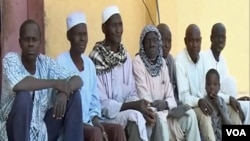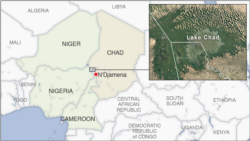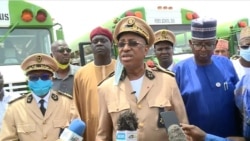The commander of multinational troops fighting Boko Haram has said at least 3,600 of the militants have surrendered since August. Nigeria-born Major General Abdul Khalifa Ibrahim spoke Sunday at the end of a visit to Cameroon.
General Ibrahim, commander of the four-nation Multinational Joint Task Force Commission, or MNJTF, says the number of militants escaping from Boko Haram is increasing by the day.
"I can tell you authoritatively from the beginning of August, about 3,000 Boko Haram members have surrendered. This is just within the Multinational Joint Task Force in Cameroon and in Nigeria,” he said.
He says it is suspected that an additional 600 militants who surrendered within the past two months to the Joint Task Force are former Boko Haram fighters.
Several thousand other defections were reported in May, when infighting broke out among Boko Haram factions after Boko Haram leader Aboubakar Shekau was declared dead.
MNJTF, headquartered in Chad's capital N'djamena, is made up of more than 10,000 troops from Niger, Cameroon, Chad and Nigeria. Ibrahim says that since August, his forces have launched “ceaseless” raids on Boko Haram camps in the Sambisa forest and the Lake Chad Basin, causing confusion among militants.
The jihadists have not responded to claims that many militants are defecting. Boko Haram usually uses social media platforms to dismiss such claims.
Ibrahim was in Yaounde for a meeting of officials of the Lake Chad Basin Commission, from Cameroon, Chad, Niger, and Nigeria.
The general and various officials say the weakening of Boko Haram has allowed thousands of displaced people to return to their homes.
Midjiyawa Bakari is governor of Cameroon's Far North region on the border with Nigeria. He says Cameroon is providing aid kits of blankets, mattresses, food and water to Nigerians who voluntarily return home.
"We have already accompanied more than 5,000 Nigerians who have gone back to Borno state and the head of state decided to hand to each refugee a kit to enable them, once in their land to start their lives."
In September, more than 1,200 former Boko Haram fighters and their family members who escaped from the jihadist group to Cameroon had returned to Chad and Nigeria.
Mahamat Fadoul Mackaye is governor of Lake Province, an administrative unit in Chad.
Mackaye says Chad's government is socially integrating militants and former fighters who are returning. He says his country is expecting foreign donors and funding agencies to provide financial and material support to develop localities destroyed by Boko Haram. He says since the death of Shekau, jihadist fighters have not had the courage to attack government troops.
Mackaye, however, said that remaining fighters of the jihadist group regularly attack villages for food.
The defections from Boko Haram do not mean the jihadist threat is going away. Lake Chad Basin member states accuse the Islamic State in West Africa Province, or the ISWAP, a Boko Haram splinter group, of infiltrating areas along the Cameroon-Nigeria and Chad border. Cameroon says ISWAP is trying to persuade civilians, especially youths, to join the jihadist group.






